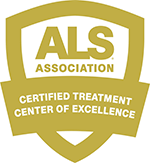The UPMC ALS Center provides comprehensive medical care with a collaborative approach to treatment. Our experts are part of a multidisciplinary team, incorporating expert neurologists, nurses, physical therapists, occupational therapists, respiratory therapists, social workers, clinical psychologists, speech and swallow therapists, and dieticians.
Our team provides advanced ALS testing, diagnosis, and treatment options for all stages of the disease. We also offer our patients the opportunity to participate in our multiple active clinical trials.
In addition to medical care, we provide education and support to both patients and their families.
What is Amyotrophic Lateral Sclerosis (ALS)
ALS, or Lou Gehrig’s disease, is a disease that affects the motor neurons, which are nerve cells in the spine and brain. These neurons control voluntary muscles, including those used to breathe, swallow, speak, walk, and move your arms and hands.
In ALS, the motor neurons deteriorate and die over time. Different motor neurons control different muscles, but the disease doesn’t affect all the motor neurons at once. ALS symptoms usually start in one area before spreading to other areas.
Treatments and Support We Offer
The UPMC ALS Center offers:
-
Medications which can slow the progression of the disease by several months and help alleviate symptoms (spasticity, emotional imbalance, excess salivation).
-
Nutritional therapy to help people with ALS maintain weight with healthy food, and diet management when swallowing or chewing difficulties develop.
-
Occupational therapy to help with appropriate exercises and durable medical equipment to perform activities of daily living and assist functional independence.
-
Physical therapy to help manage physical disabilities and mobility with appropriate exercises and assistive devices to improve safety and maximize independence.
-
Psychological support to help people cope with feelings of fear, grief, and frustration.
-
Respiratory therapy to teach breathing exercises and provide equipment to help people with ALS breathe easier and sleep better.
-
Social work support to help people with ALS find financial help, access equipment, get help with meals at home, and much more.
-
Swallowing specialists to evaluate for difficulties that would affect nutritional status and breathing and help with swallowing techniques and diet modifications to maintain safe and efficient swallowing.
-
Speech therapy to help improve communication with ALS progression using assistive technology, including eye gaze-controlled communication devices.
-
Coordination with durable medical equipment companies to manage an array of assistive devices patients may need, such as power chairs, hospital beds, braces, and respiratory equipment.
-
Coordination with home care agencies to arrange for in-home health services, such as nursing aid, and PT/OT.
 Why Choose UPMC for ALS Care?
Why Choose UPMC for ALS Care?
We are an ALS Association (ALSA) Certified Treatment Center of Excellence and one of only four treatment centers in Pennsylvania with this accreditation. Certification is earned by meeting the rigorous standards of best practices set by the ALS Association Treatment Centers of Excellence Program®.
We have also been designated an MDA-ALS Center by the Muscular Dystrophy Association in recognition of excellence in clinical and research services. We are the only such center in western Pennsylvania.
Clinical Trials and Research at the UPMC ALS Center
We are one of only a few centers internationally taking part in the COMMAND trial. This trial studies brain-computer interface (BCI) technology to improve functional independence and communication in people with severe paralysis, including people with ALS.
We are the only center in western Pennsylvania that is part of the HEALEY ALS Platform Trial. ALS platform trials accelerate the path to new ALS therapies by testing multiple promising experimental drugs at the same time, decreasing the trial time and increasing patient participation. Using an efficient design with increased access for people with ALS, there is a 75% chance of receiving the study product and a 25% chance of receiving a placebo.
ALS is a devastating diagnosis for patients and their families. The hope is to find a treatment that can add years of quality to people's lives, and one day stop the disease completely.
To learn more about our research or enroll in one of our clinical trials please email ALSRES@pitt.edu.
















 Why Choose UPMC for ALS Care?
Why Choose UPMC for ALS Care?

